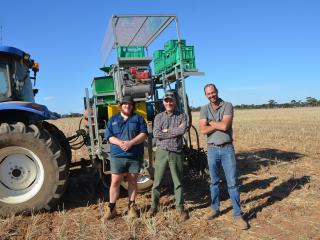Western Australia
May 30, 2023

Department of Primary Industries and Regional Development technical officer Matt Mills, Crop Science and Grain Production manager Bob French and research scientist Dion Nicol preparing to seed at the Merredin trial site.
Department of Primary Industries and Regional Development researchers have begun three large-scale trials looking at future-focused farming systems in Western Australia.
The four-year field trials are part of the Western Australian Farming Systems project, which is investigating how farming practices can increase profit, manage risk and reduce greenhouse gas emissions.
The project, a co-investment between the Department of Primary Industries and Regional Development (DPIRD) and the Grains Research and Development Corporation, is targeting medium and low rainfall regions of WA.
DPIRD dryland farming systems manager Vanessa Stewart said the project aimed to increase adoption and integration of agronomic and systems innovations to increase whole farm profitability through managing enterprise mix and paddock rotations.
“We’ve consulted with about 150 local growers and advisers to understand key issues the project will need to address,” Ms Stewart said.
Regional Innovation Groups, made up of local growers and advisers, have been established to provide ongoing input into the research direction and system trial treatments in each region.
DPIRD research scientist Martin Harries said sowing was underway at trial sites across the grainbelt at Northampton (medium rainfall), Lake Grace (medium rainfall) and Merredin (low rainfall).
“We are addressing three key project outputs: system break options that deliver improved profit and acceptable risk; analysis of the opportunities and risks of changing seeding window opportunities; and management options for maintaining profitability under low greenhouse gas emissions scenarios,” Dr Harries said.
“The field trials will test rotations with and without legumes in the system, different sowing times (dry versus wet) and various nitrogen rates.”
Results from the field trials will combine with whole farm economic modelling and greenhouse gas accounting to examine whether reducing nitrogen inputs, diversifying rotations or changing the time of sowing can reduce financial risk and lower greenhouse gas emissions within WA farming systems.